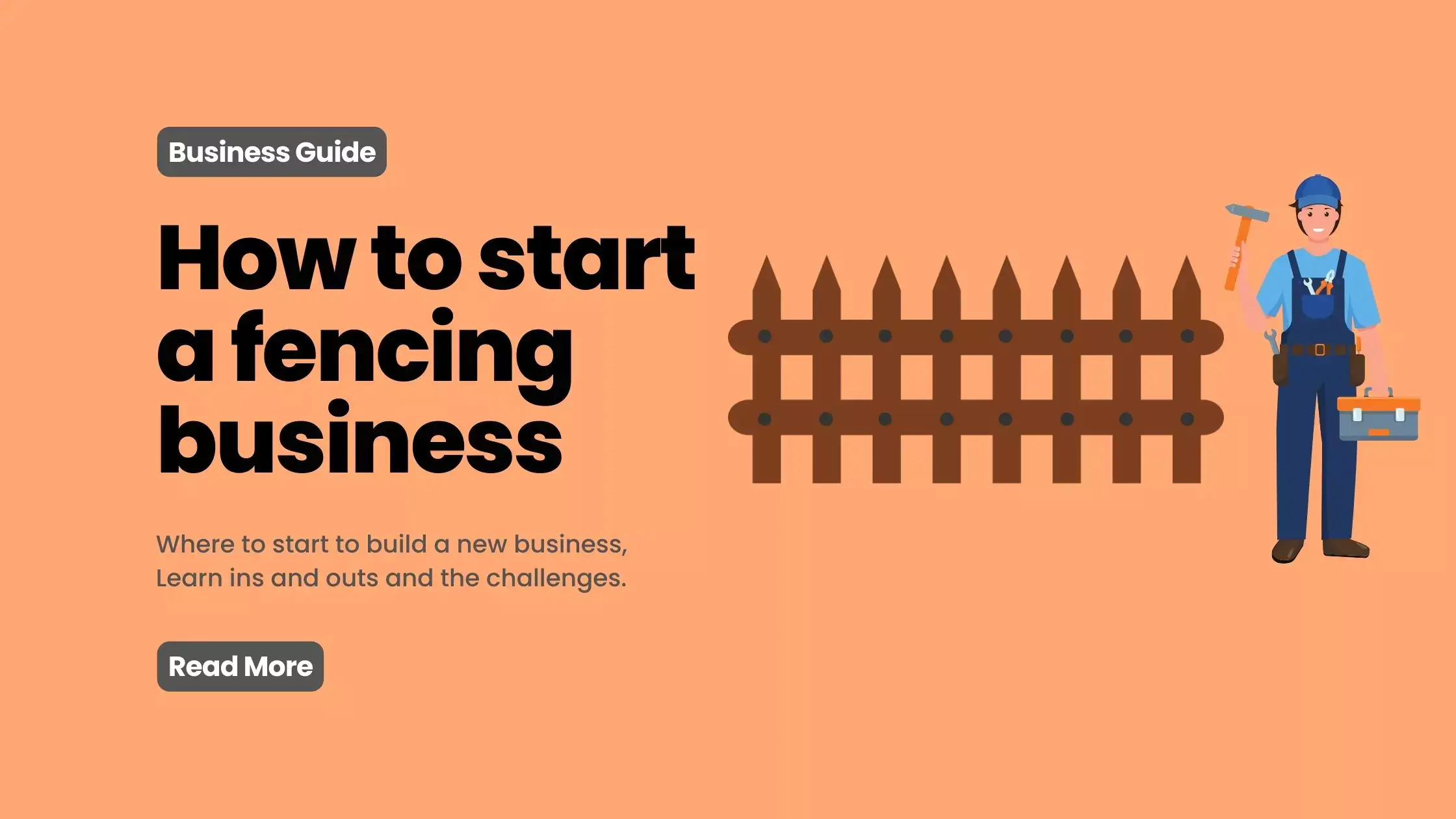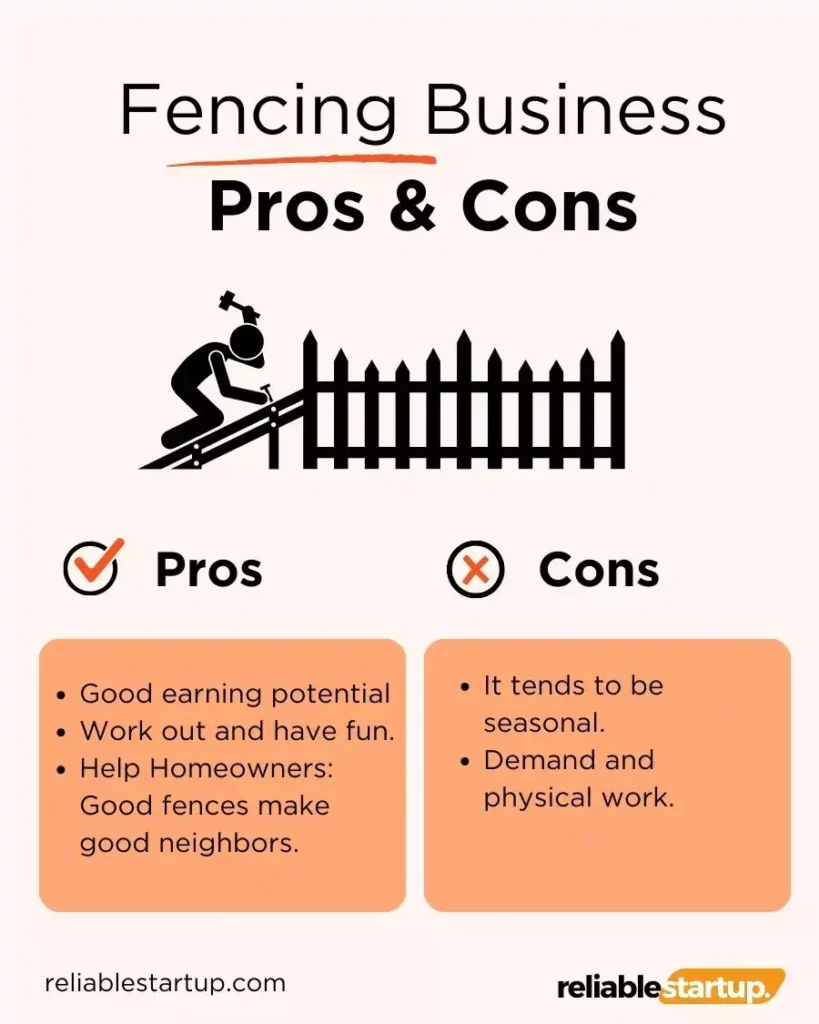How To Start A Fencing Business?

Do you work with a hammer and enjoy working outdoors? A fencing company may be the solution.
Welcome to our guide on how to start a successful fencing business!
Did you know that demand for fencing services is growing and the global fencing market is expected to reach $41.7 billion by 2025?
Whether you’re an experienced contractor or a hobbyist, starting a fencing business can be a profitable venture. In this guide, we’ll go over the steps you need to take to establish your brand, attract customers, and build a thriving fencing business.
What is a fencing business?
The fencing business is all about creating barriers that not only define property boundaries but also provide security and aesthetic appeal to homes and businesses.
Whether it’s a classic fence, a sturdy chain link barrier, or a decorative wrought iron wall, the fencing company helps clients turn their property visions into reality.
From initial consultation to installation and maintenance, these companies offer comprehensive services designed to meet each client’s unique needs.
With a fence business, you’re not just building boundaries. Building peace of mind and adding value to properties, one fence at a time.
Pro’s & Con’s:

Pro’s:
- Good earning potential
- Work out and have fun.
- Help Homeowners: Good fences make good neighbors.
Con’s:
- It tends to be seasonal.
- Demand and physical work.
Trends and challenges:
Trends:
- Black wire fences are cost-effective, low maintenance, and gaining popularity
- 6-foot overlapping board fences are trending as people seek more privacy.
- Using technology like drones to inspect sites.
- 3D printing is becoming more popular for creating custom fence designs.
- Use of durable materials like bamboo for fencing.
Challenges:
- How to deal with material and labor shortages.
- Fluctuations in fencing material costs.
- Changes in customer preferences and demands.
- Hire and retain fencing employees.
How much does it cost to start a fencing business?
Start-up costs for a fencing company range from $3,500 to $9,000.
Starting a fencing business requires careful consideration of costs. Here is an error:
- Equipment: Expect to invest in equipment such as saws, drills, and tape measures.
- Materials: Budget for fencing materials such as wood, chain link, or vinyl.
- Licenses and Permits: Consider the costs of obtaining the necessary licenses and permits.
- Marketing: allocate funds for advertising, website development, and business cards.
- Insurance: Protect your business with liability insurance.
- Labor: Consider hiring help for installations.
Starting a fencing business can vary in cost depending on the location and scale of the business, but careful planning and budgeting are key to success.
How much you can earn from the fencing business?
Starting a fencing business can be a profitable venture.
With the growing demand for fencing solutions, there are ample opportunities to earn solid income.
Depending on factors such as location, client, and services offered, income may vary. However, successful fence entrepreneurs often earn between $40,000 and $100,000 a year, with the potential for even higher profits as the business grows.
So if you’re considering entering the world of fencing, know that the financial rewards can be well worth the effort.
What are the barriers to entry?
Starting a fencing business comes with its fair share of challenges. Here are some barriers to entry:
- High initial investment costs.
- Intense competition from existing companies.
- Regulatory requirements and necessary permits.
- Skill and knowledge gap in fencing techniques.
- Build a reliable network of suppliers and contractors.
How much should you charge for fence installation?
Determining the right price for fence installation is critical to the success of your business.
Several factors come into play, such as the type of fence, its length, the materials used, and the complexity of the job. It is important to thoroughly research market rates in your area and consider your costs, including labor and materials.
Remember to also consider their experience and the quality of their work. By striking a balance between competition and profitability, you can ensure that your pricing strategy not only attracts customers but also sustains your fencing business for the long term.
How do fencing companies make money?
Fencing companies make money by providing various services and products to their customers. This is how they do it:
1. Fencing Installation: Fencing companies make money installing fences for residential and commercial properties. They charge customers for the materials used and the labor involved in the installation process.
2. Repair Services: Another way fencing companies generate income is by offering repair services. This includes repairing damaged or broken fences for their clients, who charge based on the extent of the damage and the need for repairs.
3. Custom Design: Some customers prefer custom fencing solutions that suit their specific needs and preferences. Fence companies offer design services and charge more to create unique, custom fence designs.
4. Maintenance Contracts: Fence companies often offer maintenance contracts to their customers, where they provide regular maintenance and inspection services for installed fences. Customers pay a recurring fee for these maintenance contracts.
5. Product Sales: In addition to installation and services, fencing companies also make money by selling fencing equipment and accessories directly to customers who prefer to handle the installation themselves.
Conclusion:
Starting a new business will always be difficult, intimidating, and risky. But if you follow the right path, as we have shown you, you can turn things around in your favor.
So continue. Do your industry research just like we showed in Step 1 and start your own successful fencing business from there.






